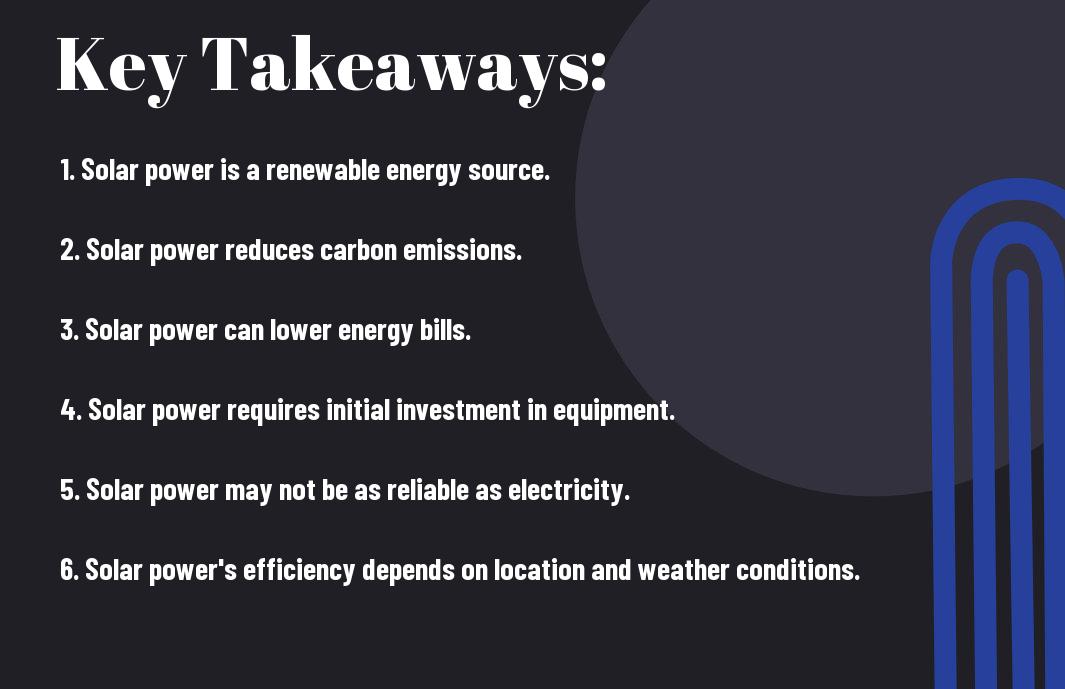There’s a growing debate about whether solar power can truly compare to traditional electricity sources. When considering the benefits of solar power, you may be surprised by its efficiency and environmental advantages. In this article, we will probe into the differences between solar power and electricity to help you make an informed decision on which energy source is the best fit for your needs. So, let’s explore the fascinating world of solar power and electricity together.

Key Takeaways:
- Solar power is a form of electricity: Solar power is a renewable energy source that can generate electricity through photovoltaic panels.
- Benefits of solar power: Solar power is sustainable, reduces electricity bills, and has minimal environmental impact compared to traditional electricity sources.
- Limitations of solar power: Solar power generation depends on sunlight availability, making it less consistent than conventional electricity sources.
- Cost considerations: While the initial investment in solar panels can be high, long-term savings on electricity bills and potential government incentives can make it cost-effective.
- Complementary relationship: Solar power can be used in conjunction with traditional electricity sources to create a more reliable and environmentally friendly energy mix.

The Basics of Solar Power
How Solar Panels Work
For the uninitiated, solar panels work by capturing sunlight and converting it into electricity through a process called the photovoltaic effect. As sunlight hits the solar panels, the energy from the photons is absorbed by the silicon cells in the panels, knocking electrons loose and creating a flow of electricity. This electricity is then converted from direct current (DC) to alternating current (AC) by an inverter, making it usable for your home.
Advantages of Solar Power
Solar power offers numerous advantages that make it a compelling choice for your energy needs. Firstly, it is a renewable energy source, meaning that the sun’s rays are inexhaustible and can be relied upon for years to come. Additionally, solar power is environmentally friendly, producing no greenhouse gas emissions or air pollutants during operation. This clean energy source helps reduce your carbon footprint and contribute to a more sustainable future.
Furthermore, by installing solar panels on your property, you can potentially save money on your electricity bills in the long run. Once the initial investment is made, the energy from the sun is free, allowing you to generate your electricity and reduce your dependence on traditional utility providers. Solar power also adds value to your home, making it a smart investment for both your wallet and the planet.
The Basics of Electricity
Even though solar power is often hailed as the future of energy, it’s vital to understand the basics of electricity to appreciate its significance. Electricity serves as the lifeblood that powers our homes, businesses, and everyday devices. It is a form of energy resulting from the movement of electrons along a conductor, such as a wire. Understanding how electricity is generated and its advantages can help you grasp the importance of this vital resource.
How Electricity is Generated
To generate electricity, power plants rely on various energy sources such as coal, natural gas, nuclear, and renewable sources like solar or wind. The most common method involves using a turbine to convert mechanical energy into electrical energy. This process usually involves spinning a magnet within a coil of wire, inducing an electric current. The generated electricity is then transmitted through power lines to homes and businesses for consumption.
Advantages of Electricity
Generated electricity offers several advantages over other forms of energy. It is highly versatile, powering everything from lighting and heating to electronics and transportation. Additionally, electricity is a clean energy source when produced using renewable resources like solar or wind power, reducing harmful emissions and environmental impact. This versatility and sustainability make electricity a vital component of modern society.
Environmental Impact
Carbon Footprint of Solar Power
Unlike traditional electricity generation, solar power has a minimal carbon footprint. Any emissions produced during the manufacturing and installation of solar panels are quickly offset by the clean energy they produce. Solar power relies on harnessing the sun’s rays to generate electricity, making it a renewable and sustainable energy source.
Carbon Footprint of Electricity
Electricity generated from fossil fuels like coal, oil, and natural gas has a significant carbon footprint. The burning of these fuels releases greenhouse gases into the atmosphere, contributing to climate change and air pollution. The extraction, transportation, and combustion of fossil fuels all leave a lasting environmental impact.
Understanding the carbon footprint of electricity is necessary for making informed decisions about energy consumption. By opting for cleaner sources of power like solar energy, you can significantly reduce your carbon emissions and help combat climate change.
Comparison of Environmental Effects
| Environmental Aspect | Solar Power |
| Emissions | Low carbon footprint |
| Resource Depletion | Renewable energy source |
Power generation methods have varying environmental impacts. Solar power offers a clean and sustainable alternative to traditional electricity generation, reducing emissions and dependence on finite resources.

Cost and Efficiency
Once again, when comparing solar power to traditional electricity, a significant factor to consider is the cost and efficiency of both systems. Let’s examine into the details to help you make an informed decision for your energy needs.
Initial Investment in Solar Power
One of the main considerations when opting for solar power is the initial investment required for installing solar panels. While the upfront cost can be substantial, it is vital to remember that this is a long-term investment that can lead to significant savings in the future. By harnessing the power of the sun, you can reduce your reliance on traditional electricity and even sell excess energy back to the grid in some cases.
Ongoing Costs of Solar Power
Cost-wise, solar power can lead to savings over time as you generate your electricity. Once the initial investment is recouped, your ongoing costs are mainly maintenance and occasional repairs. This can be significantly lower than continually paying electricity bills, especially with rising energy costs. Understanding the long-term benefits can help you see the value of investing in solar power for your home or business.
Cost sustainability and predictability are crucial advantages of solar power, offering stability amidst fluctuating traditional energy prices. Besides, you can explore options such as leasing solar panels or entering into power purchase agreements to make the transition to solar more financially feasible.
Efficiency of Solar Power Systems
Power efficiency is another vital aspect to consider when comparing solar power to traditional electricity. Solar power systems have become increasingly more efficient over time, with advancements in technology improving energy conversion rates. This means that you can generate more electricity using the same amount of sunlight, maximizing the benefits of your solar panels.
Investment in energy-efficient components and high-quality solar panels can further enhance the efficiency of your solar power system. By optimizing your setup, you can ensure that you are maximizing the energy output and reaping the rewards of your investment in clean energy.
Reliability and Accessibility
Intermittency of Solar Power
An important aspect to consider when evaluating solar power is its intermittency. Solar power generation is highly dependent on weather conditions and sunlight availability. Cloudy days, rain, or night-time significantly reduce the efficiency of solar panels, leading to fluctuations in power output. This intermittency can pose challenges in meeting constant electricity demands, especially during periods of low sunlight.
Reliability of Electricity
With traditional electricity sources, such as fossil fuels or nuclear power plants, the reliability of power supply is generally consistent. These methods can provide a steady flow of electricity without being affected by external factors like weather conditions. This reliability ensures that your electrical needs are met consistently, regardless of the time of day or weather conditions.
Accessibility
In the matter of accessibility, traditional electricity is widely available and easily accessible in most urban and rural areas. The infrastructure for generating and distributing electricity is well-established, ensuring that you can easily access electricity for your daily needs. This accessibility makes traditional electricity a reliable source of power for your home or business.
Accessibility of Solar Power vs. Electricity
Despite advancements in solar power technology, the accessibility of solar power still lags behind traditional electricity sources. Installing solar panels requires a significant upfront investment, and the availability of sunlight can affect the reliability of the power supply. Additionally, not all areas may be suitable for solar panel installation, further limiting the accessibility of solar power as compared to traditional electricity.
Reliability
When considering the accessibility of solar power versus traditional electricity, it’s important to evaluate the reliability of power supply. While solar power offers a renewable and environmentally friendly alternative, the intermittent nature of sunlight and the upfront costs of installation may impact its reliability compared to the consistent supply offered by traditional electricity sources.
Technological Advancements
Innovations in Solar Panel Technology
Technological advancements in solar panel technology have greatly improved the efficiency and affordability of residential solar electricity. Innovations such as higher efficiency solar cells, anti-reflective coatings, and smart solar tracking systems have made solar panels more productive and reliable. These enhancements not only increase the amount of electricity generated but also reduce the overall cost of installing and maintaining solar power systems. By adopting these innovations, you can benefit from increased energy savings and a reduced carbon footprint. To learn more about the benefits of residential solar electricity, click here.
Advancements in Energy Storage
Solar power technology has also seen significant advancements in energy storage solutions, such as lithium-ion batteries and flow batteries. These innovations allow you to store excess energy generated during the day for use during the night or when sunlight is limited. Energy storage systems help improve the reliability and efficiency of your solar power setup by ensuring a constant power supply even when the sun is not shining. By incorporating advanced energy storage options, you can maximize the benefits of solar power and further reduce your reliance on traditional grid electricity.
Impact of Technology on Solar Power’s Competitiveness
Technological advancements have played a crucial role in enhancing the competitiveness of solar power as a viable alternative to traditional electricity sources. Improved efficiency, reduced costs, and increased reliability have made solar power more attractive to consumers and businesses alike. With ongoing research and development in the solar energy sector, the future looks promising for even greater advancements that will continue to strengthen the position of solar power in the energy landscape. By staying informed about the latest technological innovations, you can make informed decisions about incorporating solar power into your energy strategy.
Summing up
With these considerations, it is clear that solar power and electricity each have their own set of advantages and limitations. While solar power is a renewable source of energy that helps reduce carbon emissions and reliance on fossil fuels, it may not be as reliable or consistent as traditional electricity. Understanding the differences between the two can help you make informed decisions about which energy source is best for your needs.
Q: Is solar power as good as electricity?
A: Solar power is a form of electricity that is generated using sunlight as a renewable energy source. While traditional electricity can be sourced from various methods such as fossil fuels, nuclear power, or hydroelectric dams, solar power is considered a cleaner and more sustainable alternative. So yes, solar power is as good as traditional electricity, if not better.
Q: How does solar power compare to traditional electricity in terms of cost?
A: Initially, the installation of solar panels and related equipment can be costly. However, in the long run, solar power can be more cost-effective as sunlight is free and unlimited. With advancements in technology and government incentives, the cost of solar power has significantly decreased, making it more accessible and affordable for homeowners and businesses.
Q: What are the environmental benefits of using solar power over traditional electricity?
A: Solar power has numerous environmental benefits compared to traditional electricity generation methods. Solar power produces zero greenhouse gas emissions during operation, helping to combat climate change and reduce air pollution. Additionally, solar power helps to conserve water resources as it does not require water for cooling systems like many traditional power plants do. By choosing solar power, individuals and businesses can help protect the environment and promote sustainability.
